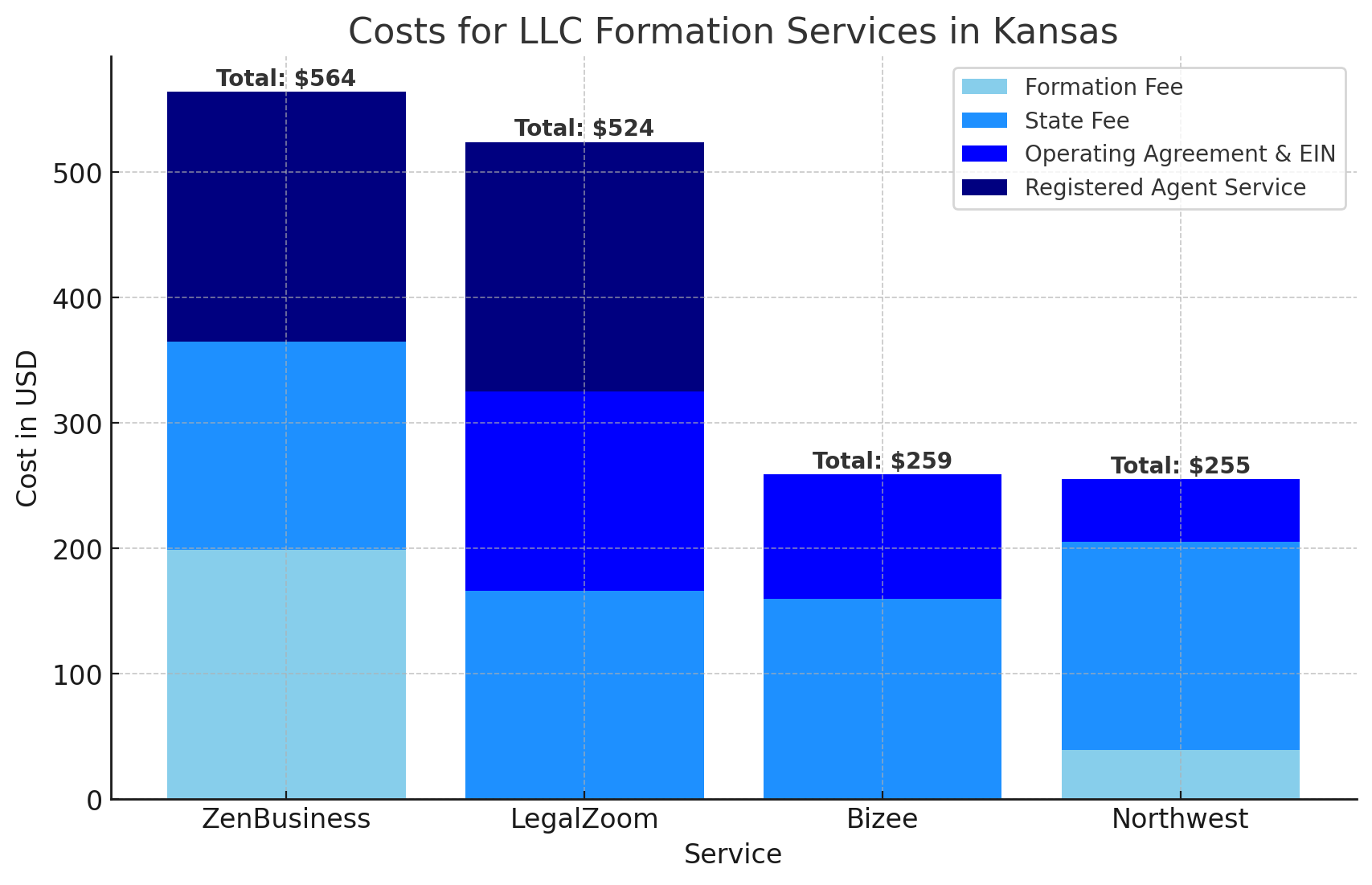Are you planning to launch a business in Kansas? Forming a Limited Liability Company (LLC) is a crucial step towards protecting your personal assets and gaining credibility.
This guide will walk you through the process of starting your LLC in Kansas, laying out each step clearly and concisely. Whether you're a first-time founder or an experienced entrepreneur, this article will provide you with the essential information needed for forming an LLC in Kansas.
Options for Forming an LLC in Kansas
When forming an LLC in Kansas, you have a few options:
- Do-It-Yourself (DIY): For those who are confident in navigating legal processes independently.
Go to the Kansas Secretary of State’s website to set up the LLC and then to the IRS’s website to get your EIN (Employer Identification Number). - Hiring a Lawyer: Ideal for those seeking personalized legal advice, particularly for complex situations.
- Using a Formation Service: A cost-effective and efficient option. Popular services include Bizee, ZenBusiness, LegalZoom, and our top recommendation, Northwest Registered Agent.

Steps to Form an LLC in Kansas
- Choose Your LLC’s Name: Your LLC’s name must be unique and include "Limited Liability Company" or its abbreviations. It should not include words that might confuse your business with a government agency or regulated entity.
Complying with Kansas naming guidelines is essential. Kansas rules for naming LLCs are detailed in Kan. Stat. § 17-7920. - Designate a Registered Agent: Kansas law requires a registered agent with a physical address in the state to handle your LLC's legal documents.
- File the Articles of Organization: Submit this crucial form online or via mail to the Kansas Secretary of State, including basic details about your LLC and a filing fee of $160 online ($165 by mail).
- Draft an Operating Agreement: Not required by Kansas law but advisable to outline the operational structure and member roles in your LLC.
- Obtain an Employer Identification Number (EIN): Necessary for tax purposes, this can be obtained from the IRS website.
- Open a Business Bank Account: Essential for managing your LLC's finances and separating them from personal funds.
- Fund Your LLC: Capitalize your business through investments, loans, or other financing methods.
- Ongoing Compliance: File an annual report with the Kansas Secretary of State and maintain compliance with any other legal requirements.
Establishing Your LLC with Northwest Registered Agent
Northwest Registered Agent simplifies the LLC formation process. By clicking on the button below, you can use our affiliate link
and form your LLC in Kansas for only $39, plus state fees. This exclusive offer includes their registered agent service free for the first year, adding extra value and savings for your new venture.
We get commissions for purchases made through links in this post.
Legal Considerations and Compliance in Kansas
Ensure that your LLC name complies with Kansas regulations and maintain an accessible registered agent during business hours. Keep up with annual filings and understand all specific legal obligations to keep your LLC in good standing.
Benefits of Forming an LLC in Kansas
Forming an LLC in Kansas provides several advantages, including limited liability protection, potential tax benefits, and flexibility in management. Kansas's business-friendly climate offers numerous opportunities for growth and development in various sectors.
Common Mistakes to Avoid
Stay informed about state laws and regulations to avoid common pitfalls such as neglecting legal responsibilities or commingling personal and business finances. Consider professional services when necessary to ensure compliance and protect your interests.
Next Steps After Establishing Your LLC
Once your LLC is established, focus on developing a strong business plan, setting up efficient accounting systems, and marketing your services. Utilize available tools and resources to manage your business effectively and pave the way for success.
Conclusion
Starting an LLC in Kansas offers a pathway to securing your business and its assets. Whether you choose to do it yourself, seek legal advice, or use a formation service like Northwest Registered Agent, ensure you understand each step and comply with state-specific requirements. With the right approach, your Kansas LLC can serve as a strong foundation for your business's future.
Start an LLC in Kansas FAQs
Can you be your own registered agent in Kansas?
Yes, but if you act as your own registered agent in Kansas, your name and address will be publicly listed. You'll need to be available during regular business hours to receive any legal documents in person.
Can I change my registered agent after I start an LLC?
Yes. To change your registered agent in Kansas, use this link. You will need to file the Change of Registered Office/Agent form. It must be submitted by mail and costs $35 to file by mail, and $30 for online filings. If you’re stuck in the 90s, you can fax over the form for an additional $25 fee.
What’s the difference between a member-managed and manager-managed LLC?
If you go for a member-managed LLC, the members (owners) will handle the day-to-day operations. In a manager-managed LLC, members hire managers to run things. These managers take care of tasks such as hiring and firing employees, managing credit and bank accounts, and signing agreements and contracts.
What should be included in an operating agreement?
A personalized operating agreement addresses both the day-to-day and overarching aspects of your company, encompassing everything from member responsibilities to the dissolution of the business. Here are common topics typically included in operating agreements:
- Initial investments
- Profits, losses, and distributions
- Voting rights, decision-making powers, and management
- Transfer of membership interest
- Dissolving the business
Do I need an EIN for my Kansas LLC?
Yes, you need an EIN if your business has employees, is a multi-member LLC, or is taxed as a corporation. Even if your LLC isn't legally obligated to have an EIN, it's advisable. An EIN allows you to open bank accounts, apply for business licenses, and is generally essential for business operations. It also helps keep your Social Security Number (SSN) private during business transactions.